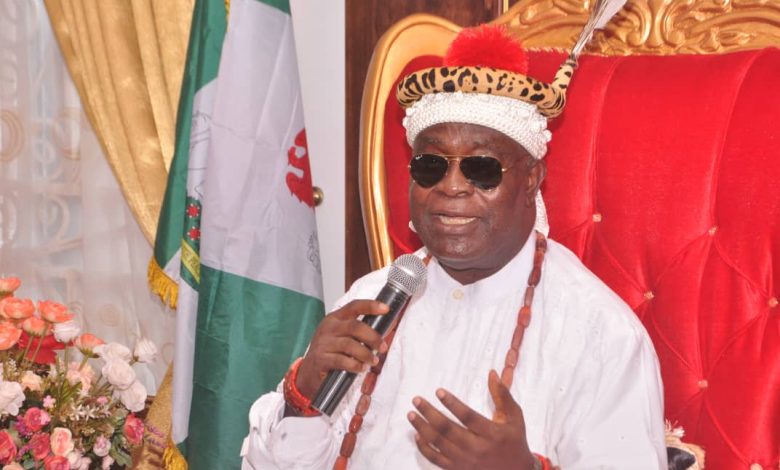Oku Ibom Ibibio Seeks Dispassionate Action Against Deforestation
...Calls For Renewed Planting Of Economic Trees

The Oku Ibom Ibibio and President General of the Akwa Ibom State Supreme Council of Traditional Rulers, His Eminence, Ntenyin (Dr.) Solomon Daniel Etuk, JP, CFR, has expressed concerns over the rising deforestation in communities with no corresponding planting of trees.
Ntenyin Etuk, the Patriarch of the Ibibios worldwide, decried that most natives are unaware of the fact that cutting off trees has the adverse effect of releasing carbon dioxide (CO²) into the atmosphere, thereby contributing to ozone layer depletion and climate change.
The Akwa Ibom premier royal father, who spoke in an exclusive interview explained that without trees and forests, the soil easily erodes and washes away, which in turn affects farming, as the barren land then becomes more susceptible to flooding, specifically in coastal regions like ours.

He further explained that the resultant damages from deforestation on the environment are widespread and consequential, as they disrupt the natural balance of ecosystems, causing soil erosion, loss of biodiversity, and changes in the local climate.
The monarch citing examples of disasters experienced in other climes, noted that deforestation also negatively affects communities by reducing access to clean water and increasing the risk of flooding and landslides.
Related: PPDF Presents Report on Impact of Gas Flaring in Akwa Ibom State
“Deforestation comes with many disadvantages, affects the water cycle, destroys the flora and fauna, and leads to an increase in carbon dioxide, which in turn increases global warming, adding “Cutting trees destroys the habitat of animals and birds, causes floods and fires and limits the supply of wood or timber.”
“Our communities must rise to checkmate this ugly trend of incessant cutting of trees for firewood or other purposes without corresponding replanting. We have to follow the footsteps of fathers who were always planting trees for economic and environmental benefits. We must plant too both for our use and for future generations,” he added.
Oku Ibom Ibibio referencing expert opinions, maintained that “the loss of trees and other vegetation can cause climate change, desertification, soil erosion, fewer crops, flooding, increased greenhouse gases in the atmosphere, and a host of problems for indigenous people.”
He also condemned the activities of sand mining in our streams and rivers, raising concerns about its dire consequences of erosion, salination of aquifers, loss of protection against storm surges and impacts on biodiversity of the affected communities.
The monarch called on the federal, state and local governments to champion sustainable development goals on agriculture and forestry practices and to come up with appropriate legislation against deforestation towards ending its consequential impact on the environment and society.
The royal father recalled that before the discovery of crude oil in our soil, our people thrived in the oil palm business with resultant economic gains but lamented that there is significant decline of investment and general interest in the sector.
He was emphatic that Akwa Ibom has to maintain its lead of having the highest number of oil palm trees per capita in Nigeria, adding that apart from oil palm, our environment is fertile for the cultivation of raffia palm, rubber, cocoa, kola nut, coconut, pears, citrus, cassava, yam, maize, rice, cowpeas, plantain, banana, pineapple and gmelina.
“Raffia palm is of high economic benefit. Apart from being used to produce alcoholic beverage and gin, its fiber, obtained from its leaves are used in making baskets, hats, mats, and dyes. Also, its slotted fruits can produce cooking oil.
“Once, we embrace agriculture as our parents did, we will be able to solve our food crises, thereby boosting our personal incomes and our economy. This is why I fully support the State government’s drive on agriculture across all local government areas, ” he added.
The monarch assured that Akwa Ibom traditional rulers on their part, will continue to dissuade people in the rural communities from cutting of trees but rather to embrace the habit of planting of trees, and engaging in farming for food security, economic purposes and environmental protection.




